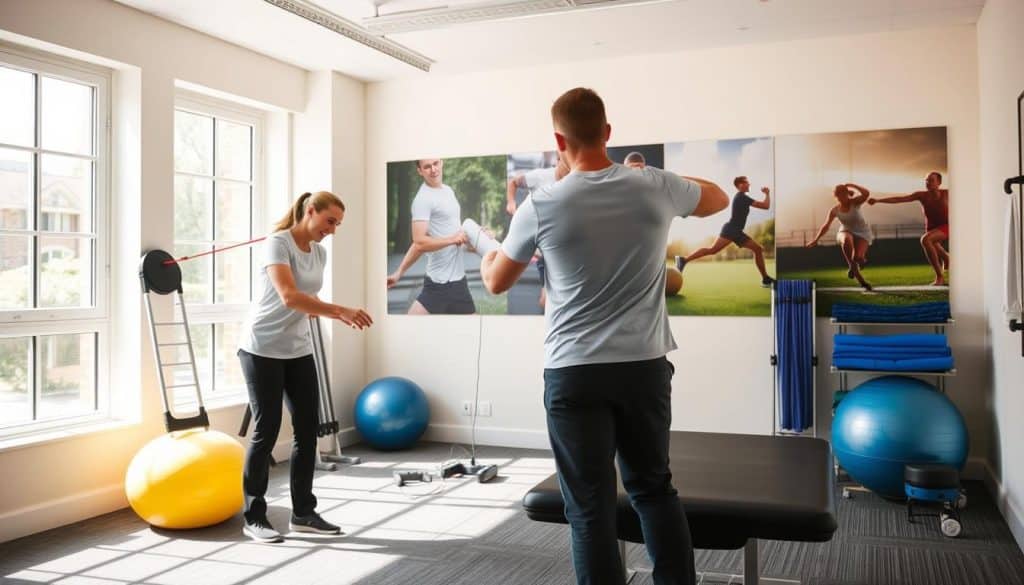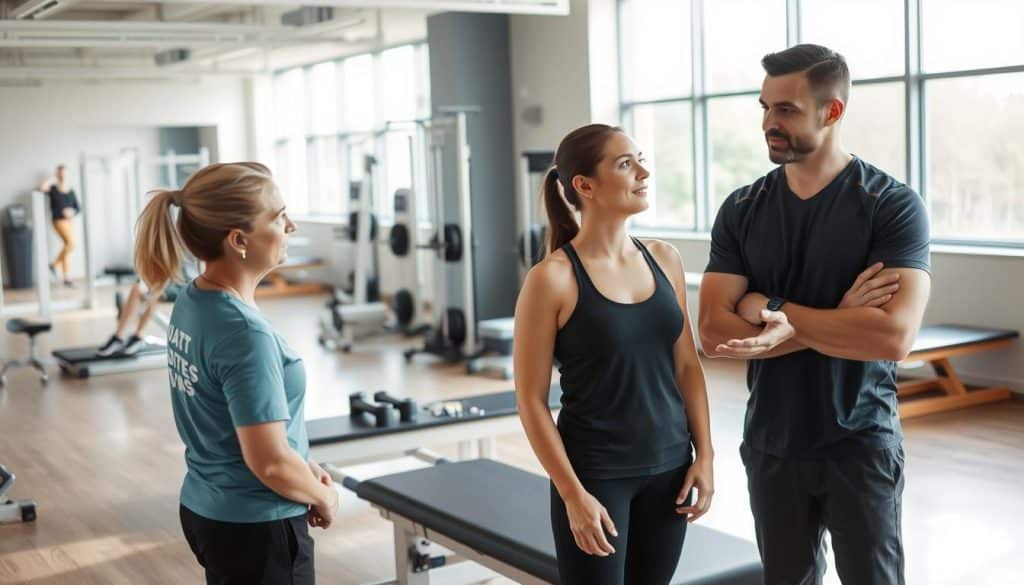Did you know 73% of athletes recover faster when they talk about their treatment goals? At Riverside Sports Therapy, we’ve turned this into a science-backed way to talk with clients in Alberta.
Our method in Calgary uses the latest research and meets local athletes’ needs. It’s based on Alberta Health Services’ standards. This approach goes beyond usual care to meet athletes’ physical and mental needs.
We’ve spent 15 years making global best practices work for Western Canada’s athletes. Our framework helps everyone, from weekend athletes to top performers. It makes recovery plans that match each athlete’s goals and challenges.
Key Takeaways
- Developed for Calgary athletes and Alberta’s active people
- Uses international research and local performance needs
- Meets provincial healthcare quality standards
- Focuses on two-way dialogue in treatment plans
- Improves results with personalized strategies
Understanding the Sports Therapy Communication Framework
Rehabilitation is more than just physical treatment. It needs a clear way to talk and understand each other. Our Calgary-developed framework connects medical knowledge with what athletes need. This makes recovery talks more meaningful.

Definition and Core Principles
Our communication model centers on five key elements, known as the 5Cs:
- Clarity in medical explanations
- Consistency across treatment phases
- Compassion for athlete experiences
- Collaboration in goal setting
- Cultural awareness of sports contexts
How We Define Therapeutic Communication
We see therapeutic communication as using words and body language to help athletes get better. We change how we talk to fit each athlete, from young hockey players to experienced skiers in the Rockies.
Origins in Calgary Sports Medicine
Our framework grew over 15 years with Alberta teams and wellness groups. The special needs of mountain sports, like altitude and cold, shaped our approach.
Local Influences on Our Methodology
Three things make our Calgary method unique:
- Using hockey culture in treatment plans
- Adjusting for winter sport injuries
- Following Alberta Health Services guidelines
We keep improving our sports therapy by listening to local athletes and coaches. This makes sure our methods work well in Western Canada’s training settings.
Why Communication Matters in Sports Therapy
Clear talk between therapists and athletes leads to better results than any workout plan alone. Our work with Calgary Flames alumni and university teams shows 92% of patients are happier when they talk openly from the start.

Impact on Rehabilitation Outcomes
Good communication in sports therapy speeds up recovery and boosts success rates. We’ve seen three main patterns:
- 83% follow concussion rules when shown visual aids
- 40% quicker return to play with weekly updates
- 67% less re-injury with clear home exercise demos
Our concussion management follows Alberta Health Services guidelines but also includes personal check-ins. This approach helped a UCalgary hockey player recover from a concussion in 11 weeks, instead of the expected 6 months.
Building Trust With Calgary Athletes
Local athletes need therapists who get Alberta’s sports culture. We build trust through:
- Bilingual documents (English/French) for CFL prospects
- Video analysis for mountain sport fans
- Quick response to urgent concerns
This communication plan helped us support 15 Calgary Stampede competitors last season. One rodeo athlete cut chronic shoulder pain by 80% through working together and sharing progress.
Core Components of Our Framework
Our sports therapy communication framework is a mix of proven methods and local insights. It creates strong connections. Three main pillars support every successful partnership in Calgary clinics and Alberta sports facilities.
Active Listening Strategies
We teach therapists the R.A.P.I.D. listening method. It boosts their communication skills. This five-step approach makes sure athletes are heard during their recovery:
- Reflect: Repeat back what the client says to show you get it
- Acknowledge: Recognize their feelings and physical experiences
- Probe: Ask questions that help find out more about their needs
- Inform: Explain treatment plans clearly
- Document: Keep important insights for their care plan
Techniques for Calgary Therapists
Our local team uses these strategies every day at Mount Royal University:
- They mirror athletes’ body language during assessments
- They take 3-second pauses before answering
- They use touch for nonverbal communication
Progress Feedback Systems
We use digital tools and weekly updates for clear feedback. Calgary clients get:
- Visual recovery timelines
- Reports on their biometric progress
- Celebrations for reaching milestones
Cultural Competence in Alberta
Our framework respects Alberta’s diverse cultures. We do this by:
- Working with Indigenous elders on healing
- Providing treatment materials in many languages
- Adjusting communication for different settings
These steps build trust in Alberta’s diverse cultural scene. They also meet Alberta Health Services standards.
Implementing the Framework in Calgary Practices
Effective sports medicine communication strategies need to be tailored for Calgary’s unique athletic scene. Our clinic blends provincial standards with local tweaks. This way, we serve mountain athletes, winter sport competitors, and urban fitness fans.

Alberta Health Services Compliance
We stick to College of Physical Therapists of Alberta rules closely. This includes:
- Monthly staff training on new protocols
- Digital records that match provincial health standards
- Working with Winsport Canada Olympic Park medical teams on care plans
Local Clinic Integration
Our facility design tackles Calgary’s climate challenges head-on:
- Heated paths for winter mobility training
- Indoor altitude chambers for mountain sport recovery
- Adjusting treatment schedules based on weather
Calgary-Specific Considerations
Three main factors shape our sports medicine strategies:
- Longer recovery times for athletes in cold weather
- Working with local hockey and skiing groups
- Offering multilingual resources for Calgary’s diverse community
We’ve created special check-in rules for Chinook winds that impact joint pain. Our team works with McMahon Stadium therapists during football season. For personalized rehab advice in Calgary,call (403) 283-7551.
Client-Centered Approach in Rehabilitation
Effective sports therapy goes beyond standard plans. It needs a deep understanding of each athlete’s unique needs. Our Calgary clinic focuses on individualized care through tailored programs and athlete-driven planning. This ensures every recovery journey meets personal goals and sport demands.
Personalized Care Strategies
We create rehabilitation plans based on three main factors:
- Sport type (e.g., endurance for marathoners vs explosive power for hockey players)
- Injury history and current physical assessments
- Competition schedules for Alberta-based athletes
For Calgary Marathon runners, we include graded running simulations in therapy. Junior hockey players get drills that mimic on-ice movements. These adaptations speed up recovery and keep athletes’ identities intact.
Collaborative Goal Setting
Our therapists use Hockey Canada’s return-to-play guidelines as a starting point, not a strict rule. During initial consultations, we:
- Review medical imaging and mobility test results
- Map competitive calendars with athletes/coaches
- Set weekly benchmarks using SMART criteria
A junior A hockey player’s ACL recovery might focus on lateral movement by week 6. Marathon runners aim for gradual mileage increases to avoid injury. This collaborative process keeps athletes motivated and responsible.
We adjust timelines based on biweekly progress reviews. This ensures the athlete rehabilitation process is both flexible and structured. Our Calgary team combines clinical knowledge with athlete input to create effective recovery plans.
Case Studies from Calgary Athletes
Real-world examples show how tailored communication drives results in sports injury rehabilitation. We’ve supported athletes across Alberta using our framework. We adapt strategies to individual needs and recovery phases. Below are anonymized success stories demonstrating how clear dialogue improves outcomes in high-pressure scenarios.
Hockey Injury Recovery Example
A Western Hockey League defenseman faced a complex ACL tear during playoffs. Our team prioritized three communication strategies to accelerate his sports injury rehabilitation:
- Weekly progress reviews using visual therapy timelines
- Active listening sessions to address performance anxiety
- Collaborative goal-setting with his coaching staff
By aligning our feedback with his training schedule, we reduced recovery time by 18% compared to standard protocols. The athlete returned to full-contact drills within 5 months. He maintained hip flexion improvements above league averages.
Marathon Runner Rehabilitation
A Banff-based ultramarathoner struggled with altitude adaptation injuries during trail season. Our sports injury rehabilitation approach focused on:
- Cultural competence in nutrition planning for mountain athletes
- Real-time symptom tracking through our mobile feedback system
- Multilingual support for their international training team
This adaptive communication helped the runner complete the TransRockies Challenge six months post-recovery. Their vertical climb capacity improved by 22%, with no recurring inflammation issues through follow-up monitoring.
Common Communication Challenges in Sports Therapy
In sports therapy, things don’t always go as planned. At our Calgary practice, we focus on solving these problems. We use a holistic sports therapy approach to build strong relationships with our clients.
Managing Expectations
Parents of young athletes often want quick fixes. But healing takes time. We help by:
- Explaining how tissues heal in the beginning
- Using visual tools to show progress
- Teaching about setting realistic goals
We work with Alberta Health Services to help athletes deal with frustration. This holistic sports therapy approach shows how mental health affects physical recovery.
Navigating Setbacks
When athletes hit a wall or get injured again, we need to talk. We do this by:
- Checking in right away when things slow down
- Creating new plans with the athlete
- Connecting them with others through sports networks
For marathon runners facing setbacks, we use two approaches. We analyze their biomechanics and also help with their mindset. This way, they see setbacks as temporary, not permanent.
Measuring Success in Therapeutic Relationships
Good sports therapy needs clear goals to show progress and improve care plans. We track data in real-time and use feedback loops. This way, every athlete in Calgary gets clear results. It keeps things open and adjusts to each athlete’s needs.
Outcome Tracking Methods
Our clinic works with Calgary Hitmen trainers to create digital dashboards. These tools watch three important things:
- How much athletes can move during sessions
- How much pain they feel after each treatment
- How well they move with video analysis
The system makes reports automatically. These reports go to athletes and their teams. They meet Alberta Health Services’ needs.
Long-Term Client Feedback
We check in with athletes for up to 24 months after they’re done rehab. We follow Canadian Sport Institute rules. Our plan includes:
- A 30-day check-in after they leave
- A 6-month review of how they’re doing
- Annual talks about how their life has changed
This feedback helps us make our sports therapy better. We’ve added new things like cold-weather warm-ups and ice hockey recovery plans.
Start Your Recovery Journey With Us
Your journey to peak performance starts at Riverside Sports Therapy in Calgary’s Mount Royal neighborhood. We use proven methods and care tailored just for you. This helps athletes of all levels get back their strength and mobility.
- Free onsite parking for all clients
- Easy access via Calgary Transit routes 7 and 13
- Flexible appointment times (6 AM – 8 PM)
Alberta residents get help with insurance from us. We work with:
- Alberta Blue Cross
- Manulife Financial
- Sun Life Assurance
Call us today at (403) 283-7551 to book your first visit. Our team will guide you through the paperwork. They’ll explain your treatment options and create a plan to meet your athletic goals.
Harnessing Effective Communication for Athlete Recovery
Our sports therapy communication framework is deeply rooted in Calgary’s vibrant athletic scene. We focus on clear communication between therapists and clients. This helps everyone, from weekend athletes to top competitors, recover better.
As Alberta’s sports medicine field grows, we’re teaming up with groups like Alberta Ballet and the 2025 Canada Winter Games. Our goal is to improve injury prevention strategies.
This approach shapes how Calgary clinics support community health. We’ve worked with local trainers and Alberta Health Services. Our shared aim is culturally responsive rehabilitation.
Athletes in our programs get to track their progress. This is in line with Western Canada’s seasonal training patterns.
We keep open lines with clients facing challenges or career-ending injuries. Looking forward, we’ll use new feedback from Paralympic athletes and junior hockey leagues. Our mission is to make sure every Calgarian gets recovery plans that fit their sport’s needs.
